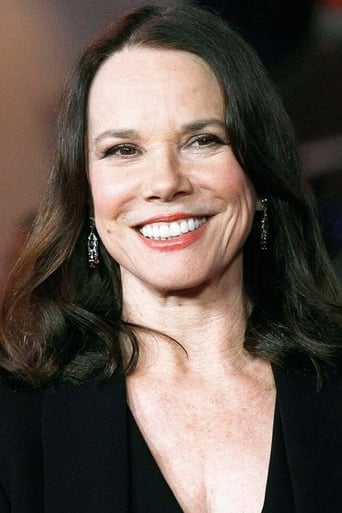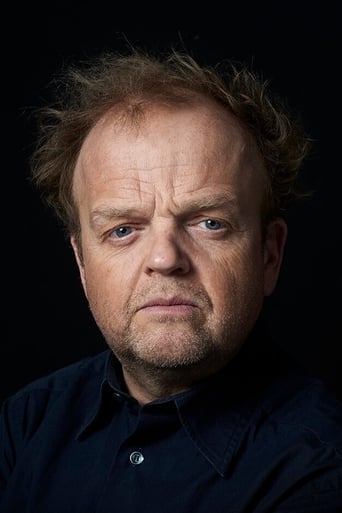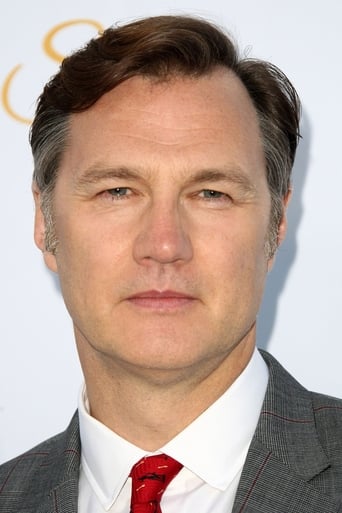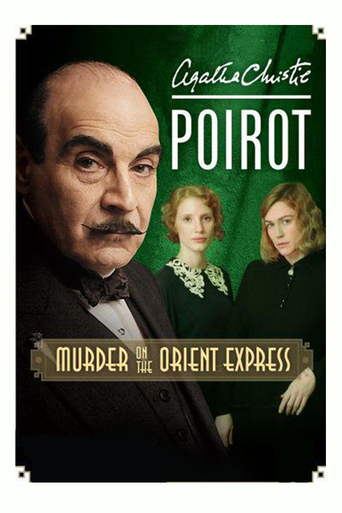
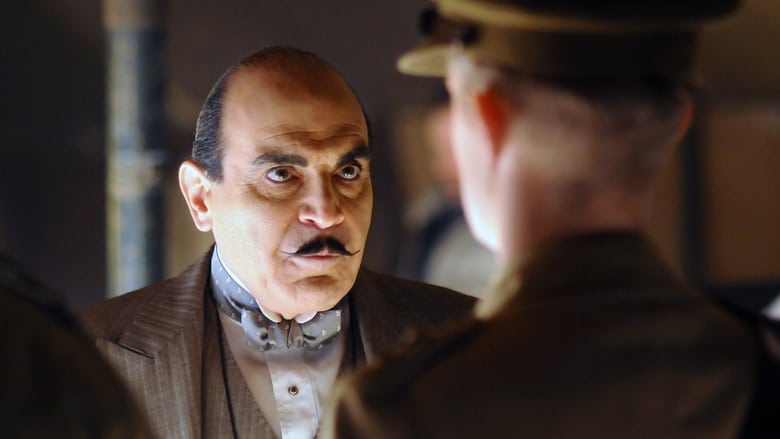
Murder on the Orient Express (2010)
Poirot investigates the murder of a shady American businessman stabbed in his compartment on the Orient Express when it is blocked by a blizzard in Croatia.
Watch Trailer
Cast
Reviews
Thanks for the memories!
I don't have all the words right now but this film is a work of art.
Good movie but grossly overrated
It's an amazing and heartbreaking story.
By the time that this film was made of Agatha Christie's "Murder on the Orient Express," David Suchet had played the role of Hercule Poirot for more than two decades. In that time, he had delved into and dissected the character that Christie created. Suchet had played Poirot in dozens of films from Christie stories. He had studied Poirot's appearance, his manners and mannerisms, his speech and his carriage. Suchet had probed the depth of the character. And, he fine-tuned his arrogant behavior with subtle, small changes as he, and the character, matured in the role over the years. Audiences knew Hercule Poirot only as Suchet now presented him. It was now 3½ decades since the original defining "Orient Express" of 1974. Albert Finney in the lead role and more than a dozen big name screen stars of the day had presented a masterpiece on film. But in between, a 2001 modernized version of the story was made for TV and aired on CBS. To say that that version was forgettable would be the kindest thing one could say about it. So, with movie rights in hand, ITV took another look at Christie's story. The writers returned to the original story and considered the darker overtones of the novel. They made one change in the plot toward the end that added an aspect of intrigue. And this time, they looked more deeply into Poirot's character, which, by now, had become so familiar to many millions of people through the British TV series and many individual films. Christie wrote a background for her 1934 mystery based on a real event. In March 1932, a kidnapper took the one-year old baby boy of the Charles Lindbergh's from their home in New Jersey. Two months later, the boy's body was found in the woods not far from the home. This movie is set in 1938, as war loomed in Europe, so the fictional kidnapping and killing in the story would have been in 1933. By 2010, the millions of viewers and fans of the previous two decades would be very much aware of Hercule Poirot's strong views on types of crimes. He vehemently disapproved of murder. No one could ever be justified in killing another human being in cold blood. Poirot believed strongly in justice under the law. And, with this new film, viewers get a further look into Poirot. He cannot tolerate revenge that leads to vigilante justice. This differs from the book though, where Poirot was a little empathetic toward those who wanted to right a miscarriage of justice. The producers did many things to capture the time of the story. The train cars were rebuilt to resemble those of the 1930s, down to the decorations, art works and frills. The costumes, dress, makeup and grooming condiments were authentic for the period. Much research went into the planning of this new film. The script, direction and acting meticulously followed the manners, mannerisms and customs of the time. The 1974 film was true to the book and met with Christie's approval. Yet it didn't explore the dark side of murder as deeply as does this 2010 film. In this film, the script and cast play it just slightly more somberly. And Greta Ohlssen iterates how the avengers justify their form of vigilante justice. It's when God has not seen that justice was done. The contrast with Poirot and his serious moral convictions (when he prays the rosary), is striking. Poirot's strong abhorrence for anyone killing another person remains. This film is every bit as good as the 1974 movie. Each has its own appeal, with a slightly different approach. The preferred roles of the casts vary between the films. Suchet's Poirot is slightly better than Finney's. But most of the rest of the cast in the 1974 film outshine the performances of the 2010 film. Richard Widmark's Rathchett is much better than that of Toby Jones who seems to be overacting at times. Sean Connery's Col Arbuthnot is much better than David Morrisey's role. And, Ingrid Bergman is for superior to Marie Croz at Greta Ohlsson.
This should be viewed as part of the complete 'Sutchet' catalogue of Poirot. In the same vein, with the same closed main character. Apart from the short cuddly stories Mr S plays the character as written. Endorsed by the Christie descendants and widely regard as the most authentic interpretation. She disliked Poirot herself! It cannot, like the rest of the the Hollywood interpretations be regard as 'charming', "so English" and other platitudes! However credible and entertaining the Finney version is it lacks bite. Most of the perb's are bitter rather than angry & vindictive. Poirot is methodical but not avenging. Please read the books, visit Devon. This is real Agatha Christie. For those slagging this off, watch the last Sutchet episode Curtain. Then re-watch this. Then you'll understand.
Lawrence Olivier was an actor who delivered rewards, but acting is not storytelling and sometimes the opposite is the case. He made a well regarded Hamlet and approached it as expected; he inhabited the character and let *that* being drive what was presented. If only he understood the confounding dynamic structure the author erected to allow us to have at each instant several beings inhabiting that soul. The beauty of the play is in how their layers, folds and governance stay always ahead of our ability to cleanly see the world's edges.Suchet has similar power over the detective he has played now for some time. He has inhabited the character and extended him far beyond what the author envisioned. Some of it is quite impressive and affords the intensity Suchet (or any actor) desires. But it fights the structure Christie mastered. It is a matter of personal discovery for me that I crave both Christie and Shakespeare. The former is about abstract purity, logical clarity where emotion is color only. Shakespeare uses urge as his primary quality, where urges can be spiky or smoky, weaving and stinking. He conveys reason without logic, sense without cleanliness.Christie's villains are simply wicked. The story is a matter of presenting logical impossibilities and having our detective sort them so that they are physically possible. These are logic puzzles. The characters have emotions, color and even motive as a second order. Her attention was all in the form; she could have no suspect be the murderer, or all. The narrator could be, or the murdered themselves. The more physically impossible, and the more unlikely the solution, the better. Like Holmes, Poirot would be far more interested in resolution than justice. Most editions of this story have a diagram of the coach, showing who could see what and where anyone could move. Facts as they appeared and were reshaped were all done so in this physical context. The Sidney Lumet 1974 version preserved all this while adding enough color to satisfy viewers who did not want to engage with the story, helping to sort the pieces.This version has none of that detective folding, where we work with the detective. The impossibilities of the murder are largely omitted. The culpability of the porter is necessary here but ignored. On the other hand, we have three fine locomotives. I don't know where they got that remarkable train, but it would be a great addition to any competent story.And of course we have Suchet, who seems to be far ahead of all the other production assets in defining what the story is and what it is about. I am not a fan of the notion that each character has/is one primary urge and the bumping of these urges is what drama is about. No, that doesn't work for me. But it is interesting to see the control he has, dragging all else behind to suit.The big surprise for me: Jessica Chastain! What a presence, something between Cate Blanchett and Julianne Moore and every bit as powerful. Suchet could take lessons; power is in what you give away to make your world work. A Two: has some interesting elements.
I can't imagine a replacement for David Suchet as Hercule Poirot. Mr. Suchet brings us the very essence of Hercule Poirot. His appearance, his every move, every gesture, is Hercule Poirot. And he is for all that, so human. When absolutely necessary, he can let his hair down (figuratively) and enjoy some good old fish and chips with his associate and friend, Hastings (Who makes an excellent Watson every time.) I haven't seen all the actors who have portrayed Poirot over the years, but of those I have seen: Albert Finney, a powerful actor, came across as too boisterously vain and aggressive, while the wonderful Peter Ustinov was simply too "English", too self-effacing despite his capabilities and accent, and he never appeared to be fussy enough about his appearance to be the true Poirot. Mr. Suchet on the other hand is vain but modestly so. He is fussy, neat and methodical to the point of appearing almost effeminate, yet without going too far. For all his vanity and his acuity, he is always understanding, kind and thoughtful. He cannot be blamed for the scripts he is sometimes handed, and I'm pretty sure it wasn't his idea to have to mention his little grey cells at least once in every episode. I don't recall the Poirot of the novels harping on his little grey cells on every other page. I love Tony Randall, but Poirot? You must be joking. He was no more like Hercule Poirot than Margaret Rutherford was like Jane Marple.
